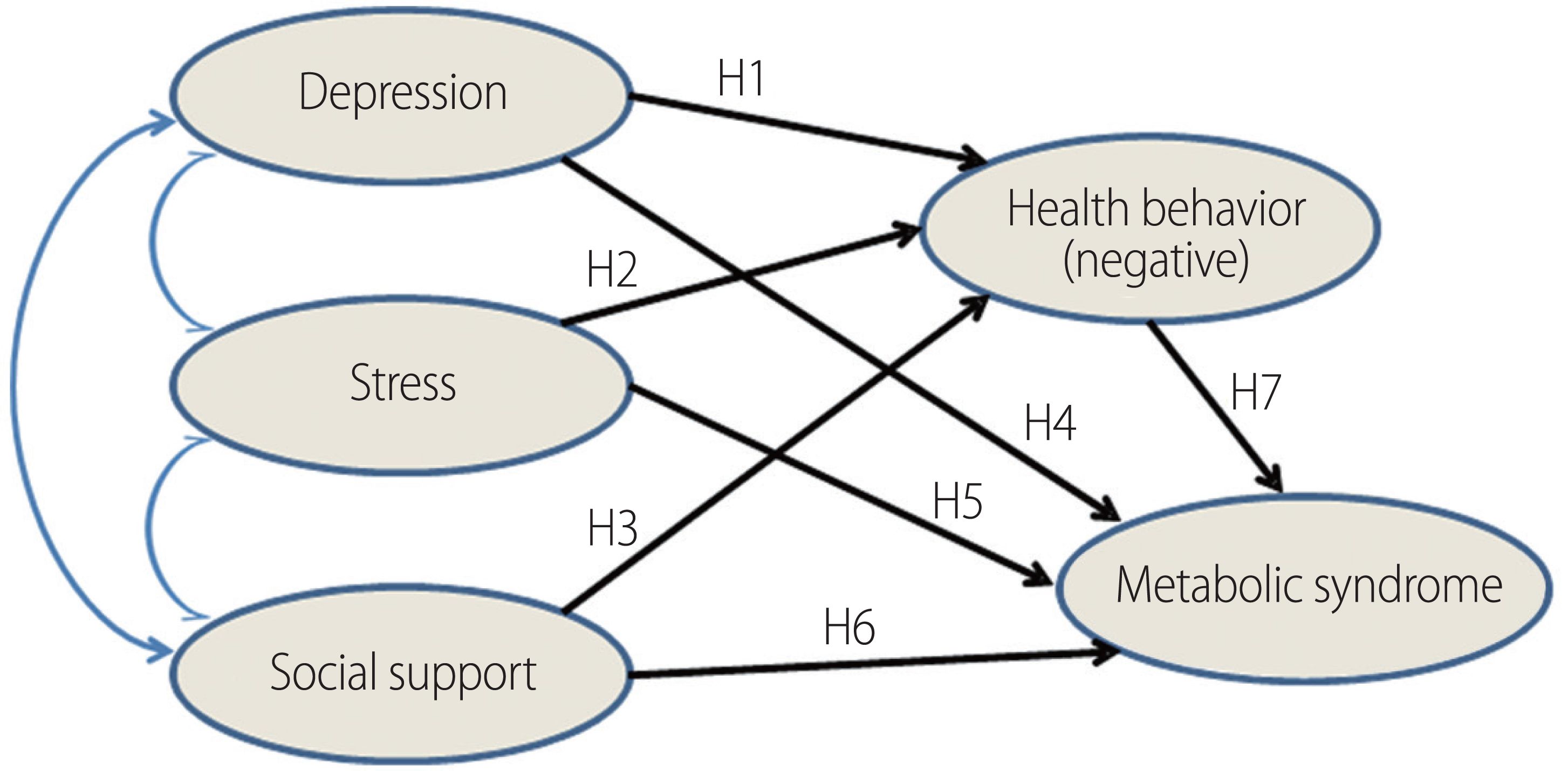1. Mottillo S., Filion K.B., Genest J., Joseph L., Pilote L., Poirer P., et al. The metabolic syndrome and cardiovascular risk a systemic review and meta-analysis. Journal of American College of Cardiology. 2010;56(14):1113-1132.
http://dx.doi.org/10.1016/j.jacc.2010.05.034
3. Park E.O., Kim J.S.. Gender and age specific prevalence of metabolic syndrome among Korean adults: Analysis of the Fifth Korean National Health and Nutrition Examination Survey. Journal of Cardiovascular Nursing. 2015;30(3):256-266.
http://dx.doi.org/10.1097/JCN.0000000000000142

4. Gyarfas I., Keltai M., Salim Y.. Effect of potentially modifiable risk factors associated with myocardial infarction in 52 countries in a case-control study based on the INTERHEART study. Orvosi Hetilap. 2006;147(15):675-686.

6. Kim M.J., Park E.O.. The prevalence and related factors of metabolic syndrome in urban and rural community. Journal of Korean Academic Society of Adult Nursing. 2014;26(1):67-77.
http://dx.doi.org/10.7475/kjan.2014.26.1.67
7. Oh S.H., Kim H.J., Sohn S.J., Sim J.S.. Changes of risk factors of metabolic syndrome among the elderly in the rural area after two years. Journal of Agricultural Medicine and Community Health. 2010;35(1):36-45.
http://dx.doi.org/10.5393/JAMCH.2010.35.1.036

8. Koh J.H., Lee M.Y., Nam S.M., Sung J.K., Jung P.M., Noh J.K., et al. Relationship between menopausal status and metabolic syndrome components in Korean women. Korean Diabetes Journal. 2008;32(3):243-251.
http://dx.doi.org/10.4093/kdj.2008.32.3.243

9. Im M.Y., Lee Y.R., Han S.J., Cho C.M.. The effects of lifestyle factors on metabolic syndrome among Korean adults. Journal of Korean Academy of Community Health Nursing. 2012;23(1):13-21.
http://dx.doi.org/10.12799/jkachn.2012.23.1.13

10. Butnoriene J., Bunevicius A., Norkus A., Bunevicius R.. Depression but not anxiety is associated with metabolic syndrome in primary care based community sample. Psychoneuroendocrinology. 2014;40:269-276.
http://dx.doi.org/10.1016/j.psyneuen.2013.11.002


13. Jeon J.H., Kim S.H.. Depression, stress and how they are related with health behaviors and metabolic syndrome among women over 40 years. Journal of the Korean Society Maternal and Child Health. 2012;16(2):263-273.
http://dx.doi.org/10.21896/jksmch.2012.16.2.263

14. Wiley J.A., Camacho T.C.. Life-style and future health: evidence from the Alameda County study. Preventive Medicine. 1980;9(1):1-21.


15. Wingard D.L., Berkman L.F., Brand R.J.. A multivariate analysis of health-related practices: A nine-year mortality follow-up of the Alameda County Study. American Journal of Epidemiology. 1982;116(5):765-775.


17. Bartoli F., Carrà G., Crocamo C., Carretta D., Clerici M.. Metabolic syndrome in people suffering from posttraumatic stress disorder: A systematic review and meta-analysis. Metabolic Syndrome and Related Disorders. 2013;11(5):301-308.
http://dx.doi.org/10.1089/met.2013.0010


18. Rosario Bezares-Sarmiento Vdel R., Bacardí-Gascón M., Márquez-Rosa S., Molinero-González O., Estrada-Grimaldo M., Jiménez-Cruz A.. Efficacy of social support on metabolic syndrome among low income rural women in Chiapas, México. Nutricion Hospitalaria. 2013;28(4):1195-1200.
http://dx.doi.org/10.3305/nh.2013.28.4.6518

19. Rozanski A., Blumenthal J.A., Kaplan J.. Impact of psychological factors on the pathogenesis of cardiovascular disease and implications for therapy. Circulation. 1999;99(16):2192-2217.
http://dx.doi.org/10.1161/01.CIR.99.16.2192


20. Sung K.W., Lee J.H.. The effects of regular walking exercise on metabolic syndrome, cardiovascular risk factors, and depressive symptoms in the elderly with diabetic mellitus. Journal of Korean Academy of Community Health Nursing. 2010;21(4):409-418.
http://dx.doi.org/10.12799/jkachn.2010.21.4.409

22. Cho M.J., Kim K.H.. Diagnostic validity of the CES-D (Korean Version) in the assessment of DSM-III-R major depression. Journal of Korean Neuropsychiatric Association. 1993;32(3):381-399.
23. Lee C.Y., Lee J.Y.. Reliability and validity of PWI (psychosocial well-being index). Journal of Preventive Medicine and Public Health. 1996;29(2):255-264.
24. Sherbourne C.D., Stewart A.L.. The MOS social support survey. Social Science & Medicine. 1991;32(6):705-714.


25. Lim M.K.. Relationships between social support and health among low income groups in urban area [master’s thesis]. 2002. Seoul: Seoul National University; 87 p.
26. Schoenborn C.A.. Health habits of U.S. adults, 1985: The ‚ÄúAlameda 7‚ÄĚ revisited. Public Health Repots. 1986;101(6):571-580.
27. Alberti K.G., Eckel R.H., Grundy S.M., Zimmet P.Z., Cleeman J.I., Donato K.A., et al. Harmonizing the metabolic syndrome: A joint interim statement of the International Diabetes Federation Task Force on Epidemiology and Prevention; National Heart, Lung, and Blood Institute; American Heart Association; World Heart Federation; International Atherosclerosis Society; and International Association for the Study of Obesity. Circulation. 2009;120(16):1640-1645.
http://dx.doi.org/10.1161/CIRCULATIONAHA.109.192644


29. Park S.Y., Yoon H., Oh H.J.. Association of metabolic syndrome, metabolic score and pulse pressure in Korea adults: Korea National Health and Nutrition Survey, 2012. Journal of Academia-Industrial Technology. 2014;15(9):5660-5667.
http://dx.doi.org/10.5762/KAIS.2014.15.9.5660
30. Eaker E.D.. Social support and physical health: Understanding the health consequences of relationships. American Journal of Epidemiology. 2005;161(3):297-298.

31. Kim T.M., Lee S.G., Jeon S.Y.. The relations of social support to the health behaviors and health status in the elderly. Korean Journal of Health Education and Promotion. 2006;23(3):99-119.




 PDF Links
PDF Links PubReader
PubReader Full text via DOI
Full text via DOI Download Citation
Download Citation Print
Print



